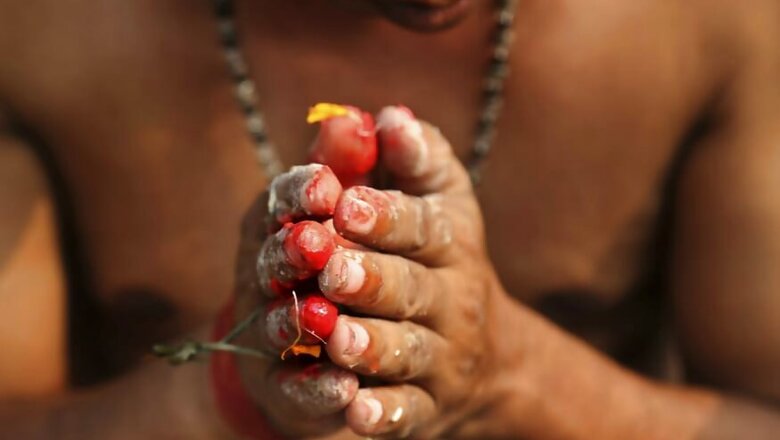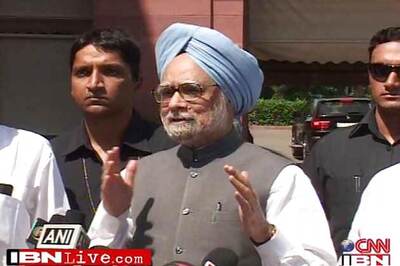
views
Hinduism is being defined as a religion like Buddhism, Christianity and Islam. Till the Rashtriya Swayamsevak Sangh (RSS) and the Hindu Mahasabha came into being, it wasn’t seen as a religion like the other three. Hinduism was treated as a social collective of different ways of life but now it is being interpreted like other religions of the world.
Over the years, the RSS and its political wing, the Bharatiya Janata Party (BJP), have projected Hinduism like the Semitic religions such as Christianity and Islam without initiating any spiritual or social reforms. The Indian society was and is far more fragmented than the Israelite society was at the time of Jesus Christ or the Arabic society at the time of Prophet Mohammad.
The hierarchised caste system and multiple tribal communities that are being defined as Hindus are likely to create more problems than solve them.
Ever since the BJP came to power at the Centre and started taking decisions that have had adverse fallout for the castes and tribes other than the top three — Brahmins, Banias or Kshatriyas — many new areas of clashes have emerged.
The Dalits (historically untouchables) and tribals particularly are encountering economic and cultural assault by the Hindutva forces on food and belief fronts. The anti-beef RSS-BJP let loose terror on these communities.
When the RSS was started in 1925 by KS Hedgewar and consolidated by MS Golwalkar, the caste fragmentations and the untouchability were worse. They didn’t initiate reforms but started organising the so-called Hindu forces against Muslims of India, as if they are all one unit. They had not developed any anti-caste discourse. Instead, they emphasised on parampara (tradition) and sanskriti (culture). They adopted vegetarianism as organisational food culture, without thinking that the Shudra, Dalit, Adivasis and the eastern-most castes were and are multi-cuisine.
The spiritual symbols for the top three varnas such as the janeu (sacred thread) can’t be worn by all Hindus. The caste system does not allow individual choices in spiritual life. The Shudras, Dalits and Adivasis were and are not supposed to wear the janeu that the men of top three varnas wear.
From the days of the writing of the Vedic texts (in the process when they were adopted as Hindu ritual mantra texts), the priesthood was reserved for the Brahmins. Over the years, other ritual services such as birth, death and house-warming were reserved for the Brahmins. It also has a link to reading and writing Sanskrit texts and interpreting them. The main religious philosophical discourse was and still is reserved for the Brahmins.
Subsequently, business was reserved for the Banias and political rule for the Kshatriyas. The agrarian tasks, artisanal work, cattle grazing — the basic production work — were and are left to Shudras, Dalits and Adivasis. They have no spiritual rights.
This is nothing but denying them the basic spiritual citizenship. Without spiritual citizenship, how do they attain moksha (salvation)?
Just as without political citizenship, there is no chance of acquiring a good position in the state, without religious citizenship, one can't train for priesthood and attain higher spiritual and philosophical attainment. This also results in denying intimate access to God, hence, no moksha.
The right to visit a Hindu temple does not constitute basic spiritual citizenship. When major spiritual systems transformed into religion, they guaranteed equal rights, at least to all male members. Women continue to face discrimination in all religions. But in Hinduism, not all men — Shudra, Dalit and Adivasi — have equal rights.
At no stage, the scriptural basis of this fragmentation — untouchability — was changed and no caste Hindu wrote a synthesised religious text that was adopted as a pooja text with common symbols for all, with citizenship rights to all Hindus.
The RSS is defining all varnas, including SC/STs, as Hindus for numbers and to use their muscle power against Muslims and Christians. This is dangerous.
When the secular constitution is mapping out citizenship rights for Hindu religious institutions, something as simple as temple entry for women is creating a crisis like the one we are witnessing at Sabarimala. This doesn’t happen in any other religion. The right to enter a Buddhist vihar, a Christian church and an Islamic mosque is guaranteed to all women.
No religion treats the body of a woman aged between 10 and 50 as impure.
The ruling BJP-RSS agrees with the priests who impose these purity rules but do not respect the universal religious rights of women, yet another dangerous practice that needs immediate reform.
The RSS-BJP is strong votary of this inequality and if they remain in power for few more years, they’ll bring back sati and child marriage.
Societies in different parts of the world have introduced reforms towards equality but the RSS-BJP wants to take the spiritual system of Hinduism backward.
This is the most dangerous situation India is facing today. Unfortunately, we are all witnesses to that process.
(Kancha Ilaiah Shepherd is a political theorist and social activist. Views are personal)




















Comments
0 comment